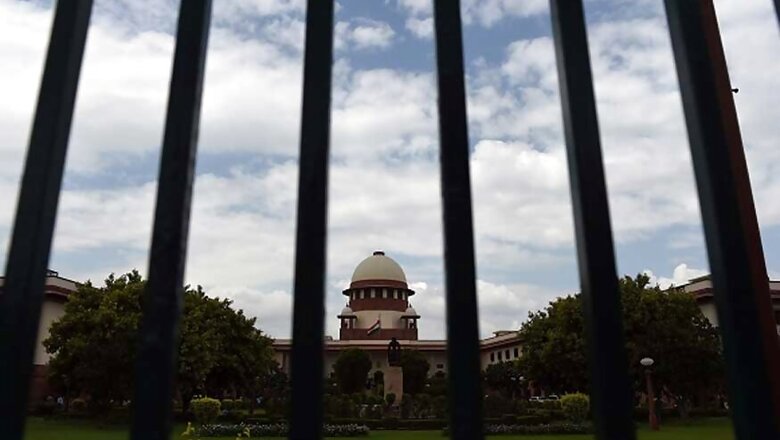
views
New Delhi: In doing away with the automatic registration of FIR and mandatory arrest in SC/ST Act cases, the statistics placed on record by the central government played a key role in the Supreme Court.
Although the government resisted tweaking with the Atrocities Act, the statistics was tell tales about closure of cases without trials and the abysmal rate of conviction.
Representing the government, Additional Solicitor General Maninder Singh had sublimated that the top court has already upheld validity of the provisions in the Act and therefore, there arises no need to re-examine it.
The law officer also said that the government is not in favour of amending the law to provide for punishment for false complaint because that would be against the spirit of the Act.
About the safeguards, the ASG maintain that the Government of India had issued advisories in February 2005, April 2010 and May 2016, and also further amended the Atrocities Act in 2016 to provide for creation of special courts as well as exclusive special courts.
But the data placed by the government before the bench of Justices Adarsh K Goel and Uday U Lalit narrated a different story altogether.
Referring to the data submitted by the National Crime Records Bureau (NCRB), Singh submitted that out of the total number of complaints investigated by the police in the year 2015, both for the persons belonging to the SC category and also belonging to the ST category, in almost 15-16% cases, police authorities filed closure reports. These complaints thus were shut without the need of trials.
Out of the cases disposed of by the courts in 2015, more than 75% cases resulted in acquittal, withdrawal or compounding of the cases.
The NCRB data of 2016 further disclosed that 5,347 cases against SCs were found to be false by the police. It was more than double the number of cases found to be true – 2150. A total number of 40,801 cases were reported during the year.
A meagre 25.7% conviction rate was observed. As against 3,753 convictions, 10,862 acquittals were recorded by the NCRB.
As far as complaints by STs are concerned, the court noted that 912 cases were found to be false by the police as against 120 true cases that did not have sufficient evidence.
The conviction rate was 20.8% with 2,293 cases resulting in acquittal or discharge, as opposed to only 602 cases of conviction during 2016.
Perusing the statistics, the bench highlighted that in the year 2015, out of 15,638 cases decided by the courts, 11,024 cases resulted in acquittal or discharge, 495 cases were withdrawn and 4,119 cases resulted in conviction.
During the hearing, the Court was also informed about the Sixth Report of the Standing Committee on Social Justice and Empowerment (2014-15) on the Scheduled Castes and the Scheduled Tribes (Prevention of Atrocities) Amendment Bill, 2014.
The report in December 2014 had rejected the stand of the Ministry, which had decided that there was no need to provide for action against false or malafide implication under the Atrocities Act.
The parliamentary panel had stated as: “The Committee is not inclined to accept the contention of the Ministry that those who are found to be misusing the provisions of the Act can be tried as per normal law of the land under the relevant sections of the IPC. The Committee is of the firm view that the PoA Act, being a special law, should be wholesome to the extent that it must contain an inbuilt provision for securing justice for those too who are falsely implicated with mala fide under it."
The panel buttressed its argument by citing Clause 14 (Punishment for false or malicious complaint and false evidence) in The Sexual Harassment of women at Workplace (Prevention, Prohibition and Redressal) Act, 2013.
Amicus curiae Amarendra Sharan, along with advocate Amit Anand Tiwary, on their part, batted for necessary safeguards against misuse of the law, and underscored the dangers of jeopardising one's liberty due to a unilateral version of the complainant. The lawyers also said that jurisdiction of a court to protect liberty of individuals cannot be ousted by literal reading of Section 18 in the Act, which negates pre-arrest bail.
The bench, in view of the statistics and the parliamentary panel's report, noted that operation of a law cannot be allowed to work itself out on caste-lines and cannot result in caste hatred.
"We are satisfied, in the light of statistics already referred as well as cited decisions and observations of the Standing Committee of Parliament that there is need to safeguard innocent citizens against false implication and unnecessary arrest for which there is no sanction under the law which is against the constitutional guarantee and law of arrest laid down by this Court," the bench said.
The court asserted that the" act cannot be converted into a charter for exploitation or oppression by any unscrupulous person or by police for extraneous reasons against other citizens".
The bench has now mandated a preliminary inquiry by police, not exceeding seven days, to decide whether an arrest is required or not. Even if the police make arrest, the apex court has ruled, a trial court will have the power to grant bail.
The judgment has created ripples in the political circle, with parties like Congress demanding a review of the verdict.
But as far as this bench in the Supreme Court is concerned, the decision of this nature was not a first. The same combination of judges last year laid down extensive guidelines in cases lodged under anti-dowry harassment law (Section 498A), whereby automatic arrests was ruled out, a preliminary inquiry was mandated.



















Comments
0 comment